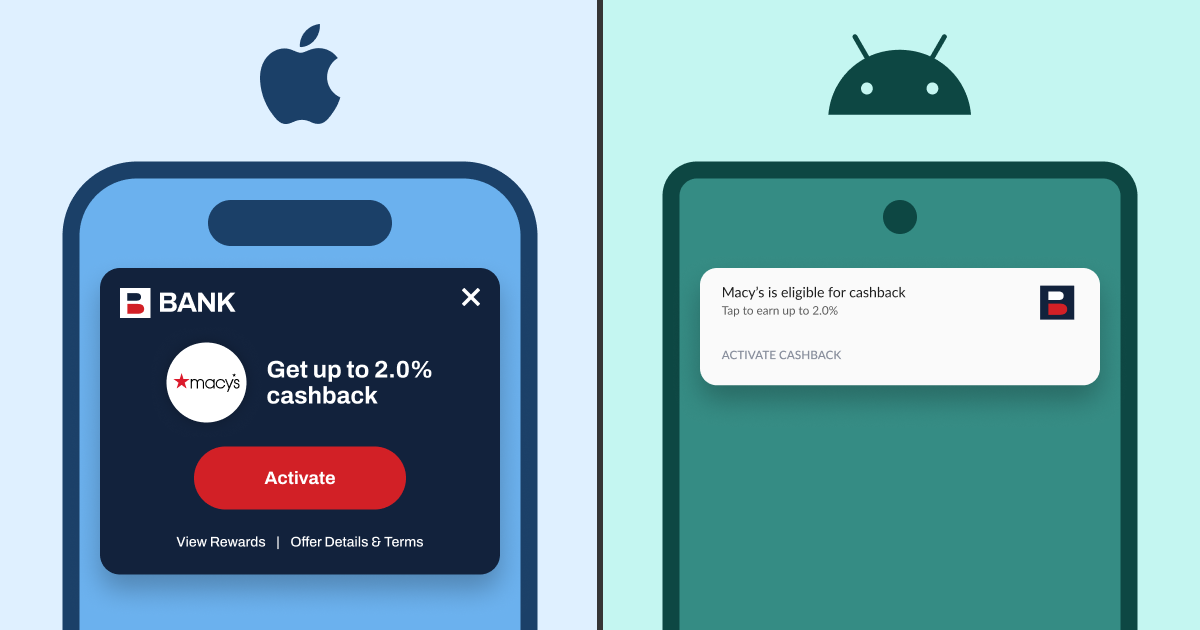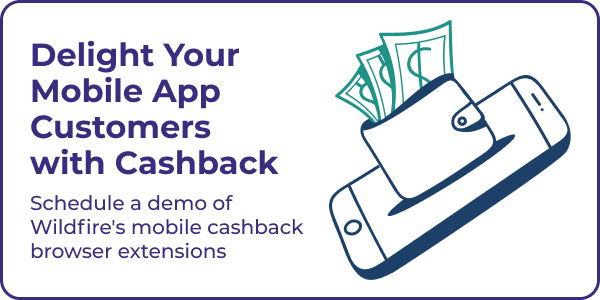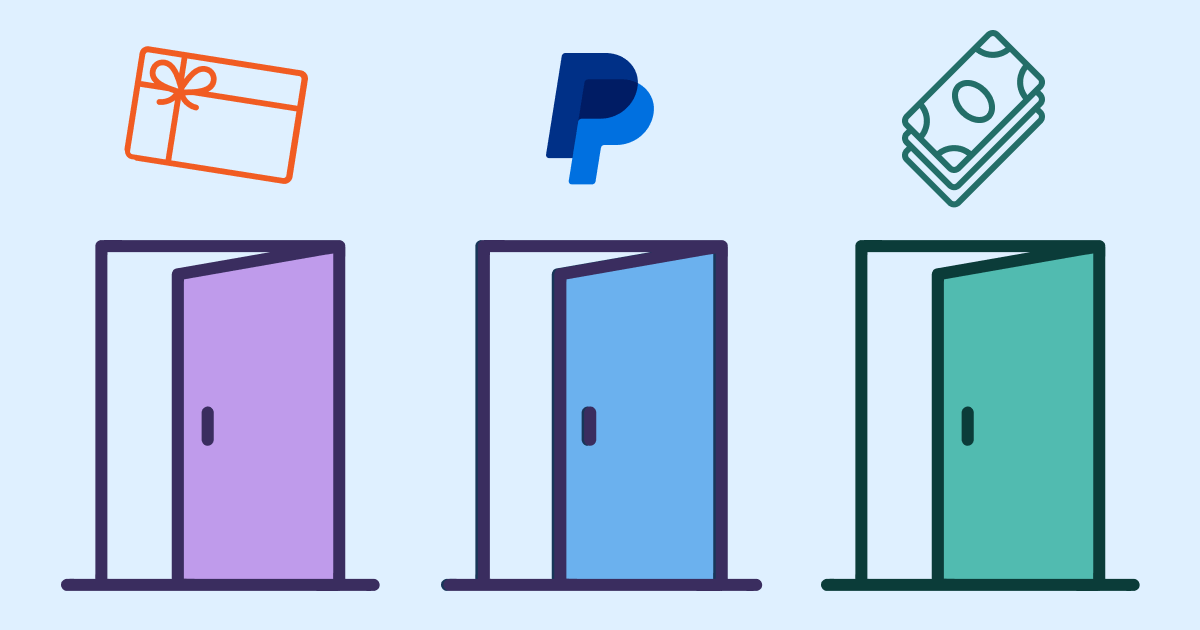Given the ubiquity of smartphones in our lives, and the fact that 92% of internet users access the internet using a mobile phone of some kind, it’s no surprise that modern consumers simply expect to receive a similar, if not better, user experience on mobile as they do on desktop.
And this extends to shopping, too. According to Convince&Convert, up to 65% of online purchases begin on a mobile device.
All of this means that today’s customer simply expects great experiences anywhere they shop, on any device. So it’s critical to meet them where they are.
For companies launching shopping rewards programs (especially if they have an iOS or Android app, or a significant portion of users accessing their products/services via mobile devices), their rewards program should extend across both mobile and desktop.
This way, the company brand is there delivering shopping rewards wherever, and however, their customer shops online.
Wildfire’s Mobile Cashback Shopping Rewards Features
Wildfire’s white-label shopping rewards platform helps brands enable cashback rewards to iPhone and Android users through our iOS Mobile Safari Extensions (“MSE”) and Android Mobile Cashback Alerts (“MCA”).
The end result - the ability to deliver cashback opportunities to customers as they are shopping on their mobile phones - is basically the same.
But, the customer experience to install and use the MSE or the MCA is slightly different due to inherent differences between the Apple and Android mobile operating systems.
How Are iOS Safari Extensions and Android Notifications for Cashback Different?
Many of the features in our mobile shopping rewards products work similar to desktop. But there are notable differences:
| iOS | Android |
| enabled by adding an extension to the iOS Safari browser on iOS 15+ | enabled through the Android OS settings * |
| typically accessed through an iOS host app | typically accessed as part of an Android app |
| before shopping rewards alerts will display, user must set specific Safari extension permissions | before cashback alerts will display, user must customize their Android Accessibility permissions |
| only displays a cashback available alert if user is shopping in Safari | only displays a cashback available alert if user is shopping in Chrome |
| displays Search Engine Results Page (SERP) decoration showing available cashback at eligible merchants | no SERP decoration of cashback available |
| can display an earnings dashboard for users to keep track of cashback & transactions | no earnings dashboard |
* Extensions are not available in mobile Chrome for Android, but Wildfire’s patented technology enables an “extension-like” experience to deliver cashback alerts
Let's dig into the specific distinctions in certain parts of the cashback rewards user experience for iOS and Android.
1) Privacy and Permissions Settings
As noted above, in both iOS Safari extensions and Android notifications, users must set certain permissions before they can use a Mobile Safari Extension or the Android Mobile Cashback Alert to receive shopping rewards notifications as they browse on mobile.
For iOS Safari extensions, including the Wildfire MSE, the user must set two permissions in Safari’s “Manage Extensions” menu to allow extensions like Wildfire’s to display over visited sites.
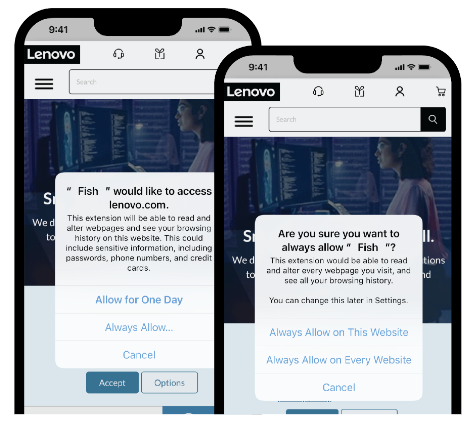 For Android notifications, including the Wildfire MCA, the user must set 2 accessibility permissions in the Android OS Settings menu (“Display & Interaction Controls”).
For Android notifications, including the Wildfire MCA, the user must set 2 accessibility permissions in the Android OS Settings menu (“Display & Interaction Controls”).
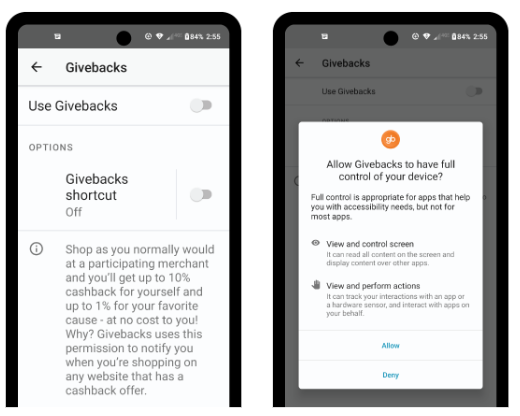 2) Cashback Rewards Alert Notifications
2) Cashback Rewards Alert Notifications
With Wildfire’s desktop cashback browser extensions, an Eligible Merchant Alert (EMA) displays as the user visits eligible merchant websites.
The EMA notifies the user of cashback shopping rewards that are available, which they can click to activate to earn cashback when they complete a purchase.
Because the iOS Safari extension for cashback, the MSE, is a browser extension, it is able to display a more robust, fully branded EMA cashback alert over the visited site.
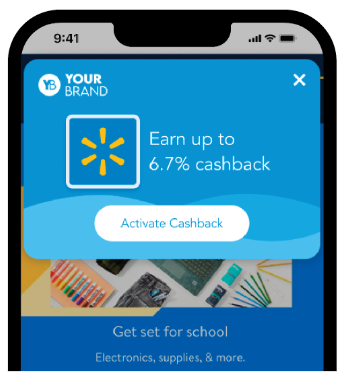 In contrast, the Android cashback alert is a push notification launched from the Android OS. So it displays a mostly “un-styleable” system notification and a text overlay on the visited site.
In contrast, the Android cashback alert is a push notification launched from the Android OS. So it displays a mostly “un-styleable” system notification and a text overlay on the visited site.
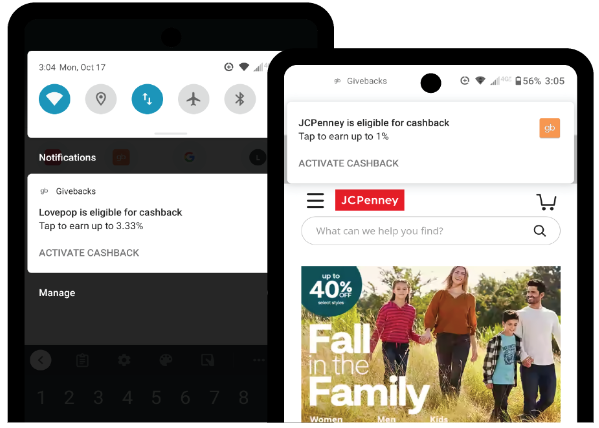
3) Earnings Dashboard
Wildfire can supply an “Earnings Dashboard” to cashback browser extension users on desktop. This dashboard allows the participants in a rewards program to see an accounting of their activated offers, completed purchases, and the status of their shopping rewards.
In Wildfire’s MSE, an Earnings Dashboard accounting for a user’s rewards transactions is built in, including the date, merchant, reward amount, and status (e.g. pending, confirmed, paid).
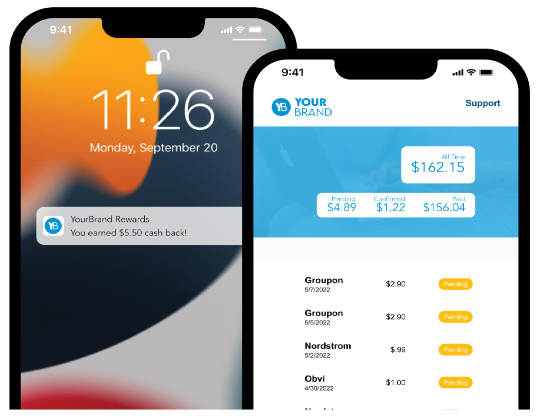 Notably, in the Wildfire MCA an Earnings Dashboard is not included.
Notably, in the Wildfire MCA an Earnings Dashboard is not included.
However, Wildfire clients can still build an Earnings Dashboard into their Android app using our Commissions API to display cashback/shopping rewards transaction details for their users.
4) SERP Decorations
Wildfire’s rewards browser extensions can display small decorations in organic search results to give searchers a preview of the merchants offering cashback shopping rewards, and in what amounts. This feature, which we call SERP Decorations, helps shoppers make decisions on which retailer to shop from based on the best rewards available.
Effectively, it allows shoppers to compare retailers in organic search results by their available rewards amounts.
In the Wildfire MSE cashback iOS Safari extension, this same feature is also available for iPhones.
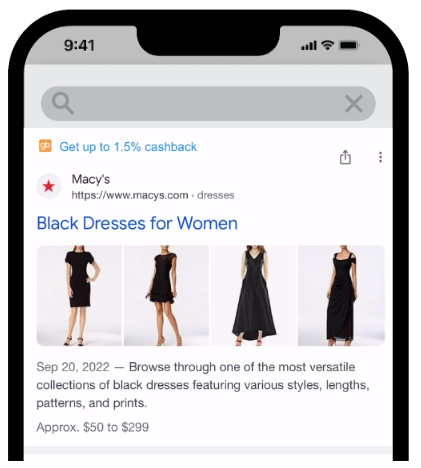 However, SERP decorations are not available in the Android MCA, since that feature is not built into the browser like a true browser extension. Therefore, organic search result web pages displayed in the Android OS cannot have an overlay of cashback alerts.
However, SERP decorations are not available in the Android MCA, since that feature is not built into the browser like a true browser extension. Therefore, organic search result web pages displayed in the Android OS cannot have an overlay of cashback alerts.
Summary
To summarize, if a business already has a robust user base for its iOS and/or Android apps, allowing those users to earn shopping rewards on their mobile devices is a seamless value-add. Building out cashback shopping rewards programs for mobile devices using either of Wildfire’s mobile cashback shopping rewards features above, can help companies deliver a fully-rounded program that delivers to the modern consumer’s expectations for their mobile shopping experience.
